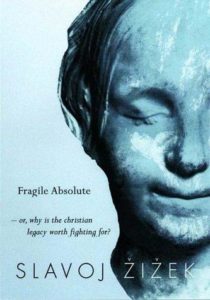“Ernesto Laclau has conceptualized . . . the struggle for hegemony. *** That is to say, class struggle is ultimately the struggle for the meaning of society ‘as such’, the struggle for which of the two classes will impose itself as the stand-in for society ‘as such’, thereby degrading its other into the stand-in for the non-Social (the destruction of, the threat to, society).
“To simplify: Does the masses’ struggle for emancipation pose a threat to civilization as such, since civilization can thrive only in a hierarchical social order? Or is it that the ruling class is a parasite threatening to drag society into self-destruction, so that the only alternative to socialism is barbarism?”
Slavoj Žižek, Afterword to Revolution at the Gates: Selected Writings of Lenin From 1917 (pp. 209-10)
See also “Multiculturalism, or, the Cultural Logic of Multinational Capitalism” (“The struggle for ideological and political hegemony is thus always the struggle for the appropriation of the terms which are ‘spontaneously’ experienced as ‘apolitical’, as transcending political boundaries.”) and “‘I Hear You with My Eyes’; or, The Invisible Master,” Gaze and Voice as Love Objects: SIC 1 (1996) (“The question of the suitability of the term ‘class struggle’ to designate today’s dominant form of antagonism is here secondary, it concerns concrete social analysis; what matters is that the very constitution of social reality involves the ‘primordial repression’ of an antagonism, so that the ultimate support of the critique of ideology—the extra ideological point of reference that authorizes us to denounce the content of our immediate experience as ‘ideological’—is not ‘reality’ but the ‘repressed’ real of antagonism.”)
Bonus links: What Is to Be Done? (“the only choice is—either bourgeois or socialist ideology. There is no middle course (for mankind has not created a ‘third’ ideology, and, moreover, in a society torn by class antagonisms there can never be a non-class or an above-class ideology).”) and comments by Domenico Losurdo (“for [Niall] Ferguson as for today’s dominant ideology, there is no doubt: colonial domination and the bloodbath of world war are synonymous with normality, or even with psychological good health, while the October Revolution – opposed to all this – represents epidemic, the spread of madness.“) and The Fragile Absolute and “Fake News” and Annie Wood Besant, An Autobiography (1893) (“‘…Must there always be rich and poor?’ Some say that it must be so; that the palace and the slum will for ever exist as the light and the shadow. Not so do I believe. I believe that the poverty is the result of ignorance and of bad social arrangements, and that therefore it may be eradicated by knowledge and by social change.”) and The Closing Circle (“[Garrett] Hardin‘s logic is clear [in arguing for racist population control as a response to environmental degradation] . . . . Here, only faintly masked, is barbarism. It denies the equal right of all human inhabitants of the earth to a humane life.”) and “The Fools and the Wise” (“Almost two hundred years ago, Joseph Jacotot, thinker of intellectual emancipation, showed how anti-egalitarian folly was the basis of a society in which every inferior was able to find someone inferior to them and enjoy this superiority.”) and “Freud and the Political” and Πολιτικά [Politics] by Aristotle (basically one of the oldest works of political philosophy arguing for hierarchy, and a pillar of political conservatism: “government is a certain ordering of those who inhabit a city.”)
Contrasting examples: “Paying the Price for Breakdown of the Country’s Bourgeois Culture” vs. “Social Democracy Is Good. But Not Good Enough”; “GOD ALMIGHTY in his most holy and wise providence, hath soe disposed of the condition of mankind, as in all times some must be rich, some poore, some high and eminent in power and dignitie; others mean and in submission.” John Winthrop, A Modell of Christian Charity (1630) vs. “The first man, who, after enclosing a piece of ground, took it into his head to say, ‘This is mine,’ and found people simple enough to believe him, was the true founder of civil society. How many crimes, how many wars, how many murders, how many misfortunes and horrors, would that man have saved the human species, who pulling up the stakes or filling up the ditches should have cried to his fellows: Be sure not to listen to this imposter; you are lost, if you forget that the fruits of the earth belong equally to us all, and the earth itself to nobody!” Jean-Jacques Rousseau, “A Discourse Upon the Origin and the Foundation of the Inequality Among Mankind” (1754); “Barbarism Begins at Home in America” vs. Saint Paul: The Foundations of Universalism; “Broken Windows” vs. “Stop Kidding Yourself: The Police Were Created to Control Working Class and Poor People”; see also The Dreyfus Affair and Snowpiercer

